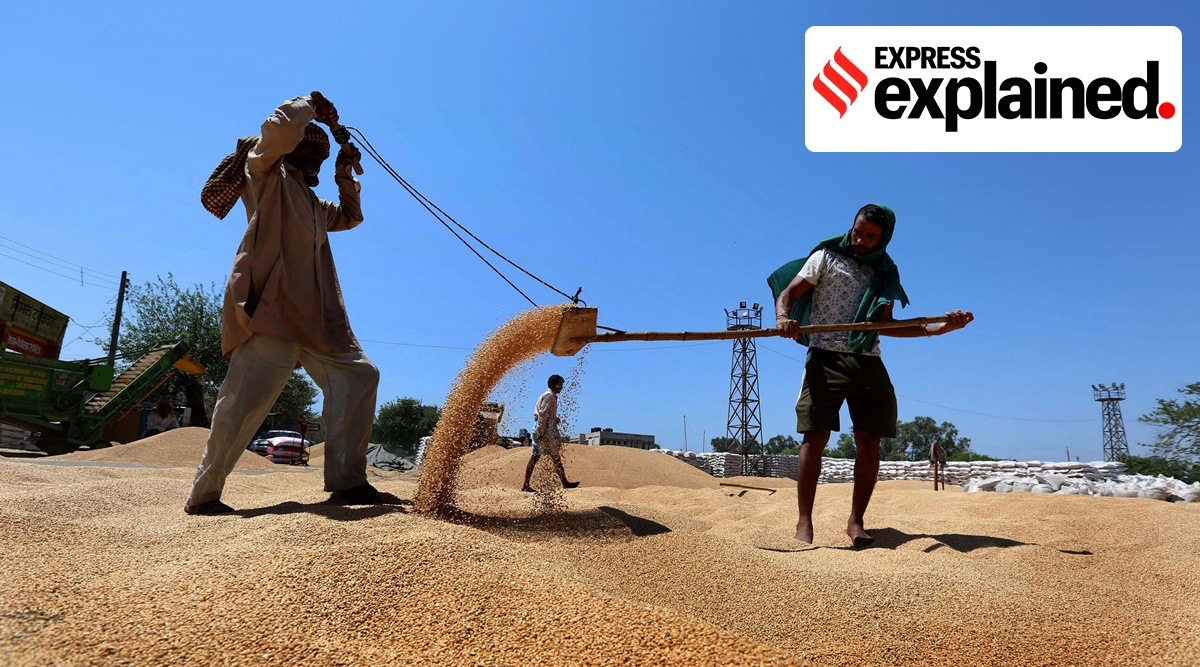Can govt increase farmers’ income in light of wheat demand in international market?
Experts said that at Mundra and Kandla Ports also the wheat was being exported at the rate of 24,000 to 25,000 per tonnes (2,400 to 2,500 per tonnes) till a week ago.
 A wheat heap at the Grain Market in Ludhiana's Ayali Kalan (Express File Photo by Gurmeet Singh)
A wheat heap at the Grain Market in Ludhiana's Ayali Kalan (Express File Photo by Gurmeet Singh)The geopolitical tension in Russia and Ukraine presents a golden opportunity to substantially enhance the farmers’ income in the country by exporting the “golden grain” — wheat. The big wheat exporters — Russia and Ukraine — are missing from the wheat export market due to war and wheat rates are also higher than MSP being offered by the government. With export the government can also fulfil the promise it made to the farming community five years ago almost a year before i.e. in 2017-18 the previous Lok Sabha elections, which led to the formation of BJP government at the centre second time in a row with a clear majority. How India can avail this Russian invasion of Ukraine to enhance farmers’ income if not double, Anju Chaba Agnihotri explains. Excerpts:
At what price wheat is being exported from India?
Experts said that at Mundra and Kandla Ports also the wheat was being exported at the rate of 2,4,000 to 25,000 per tonnes (2,400 to 2,500 per quintal) till a week ago. Both the rates are higher than the MSP of wheat being provided by the government which is Rs 2,015 per quintal. Experts said that in any case, the rates of wheat will not come down to the level of MSP being offered by the government because there is a huge demand for wheat in the International market currently and farmers can earn Rs 300 to 350 higher than the government MSP.
What is the demand for wheat in the international market?
According to government reports, India’s export has increased three times from 2020-21 to 2021-22 in one year and for the current fiscal year, the export target is almost double the last year. In 2020-21 India’s total wheat export was over 2.1 million tonnes, which had already touched 6.6 million tonnes in February end of this year and touched 7.1 million tonnes in March this year (2021-22 fiscal year) as India exported wheat to Bangla Desh, UAE, Sri Lanka and others. And the government has projected wheat export of 12-13 million tonnes for the 2022-23 fiscal year. The experts said that it might even go up to 21 million tonnes because of the huge demand for wheat from the Middle East, African and several South Asian countries.
As Ukraine and Russia were exporting around 48 million tonnes of wheat, which is 25% of the total wheat export market of the world, to the Middle East, African countries and others and now they are missing from this market which increases wheat demand manifold.
 What is the estimated production of wheat in India this year and what is the government’s wheat procurement target?
What is the estimated production of wheat in India this year and what is the government’s wheat procurement target?
India is expecting to produce around 111 million tonnes of wheat this season against 109 Million tonnes last year. The harvesting of wheat in this season has already begun in a few states. The government procurement target was 44 million tonnes on MSP including 13 million tonnes from Punjab state itself. But the government may not achieve even this target because the increasing prices of wheat in the international market also affect the rate in the local market, where they may sell the crop even at a little higher price Rs 50 to Rs 100 per quintal more than the MSP, leading to less procurement by the government.
How the Indian government can help farmers to increase their income as it promised five years ago?
If the government links the price that it pays to the farmers with the price at which the wheat is exported then the farmers will gain much more, said a senior officer in the Food Corporation of India (FCI), adding that government can get a higher price to the farmers in the International market.
Farmer Leader Jagmohan Singh, General Secretary BKU Dakuanda, said that government should enhance its procurement target by offering higher MSP to the farmers so that they should not go to the local private player, who will offer little above the MSP and sell or export the same at a higher price later. Competitive MSP by the government will increase farmers’ income when the input cost is increasing manifold, said he.
Farmer leader Sukhdev Singh Kokrikalan of BKU Ugrahan said that only a handful of farmers are having the capacity to export its crop on their own and here Government can play a big role by purchasing them at higher prices and exporting them to needy countries and earning huge foreign exchange thus enhancing the income of its farmers too which will lessen their debt burden too. “Had farmers got recommended MSP of their crop, there would have no debt on them today,” stressed he, adding that government must utilise this opportunity by exporting farmers’ wheat and getting them a good price.
Newsletter | Click to get the day’s best explainers in your inbox
“The rate of any crop is dependent on both national and international markets. When prices of any crop are low in the international market these impact local markets negatively too and now when prices of wheat are higher in the international market it should benefit the farmers here too and in government has a big role to help farmers by procuring more and more at a competitive rate to export the same,” said Prof. Sukhpal Singh, Principal Economist, (Marketing) Punjab Agriculture University (PAU, Ludhiana, adding that with this farmers’ income will increase and rate of suicides will be decreased. He also added that even if one goes by the recommendations of MS Swaminathan and Ramesh Chand Committee on MSP the wheat MSP would have been between Rs. 25,00 to 27,00 per quintal by taking all the factors into account.
Moreover, when there is a huge demand for it in the international market and rates are good, the government should procure maximum as it is an environment-friendly crop that can be stored with minimum expenses for a long time and can be exported gradually, said Prof. Sukhpal, adding that even government can export it directly by saving storage expenses because of its high demand currently.
- 01
- 02
- 03
- 04
- 05






































